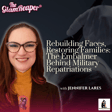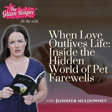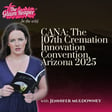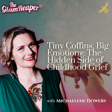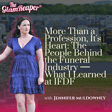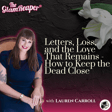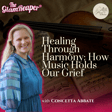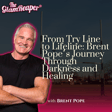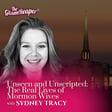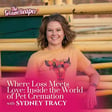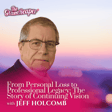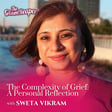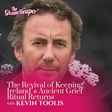
Six Feet Under Pressure: A Legacy's Burden in the Funeral Industry Finale
In this third and final part with Caleb Wilde on The Glam Reaper Podcast, Jennifer Muldowney will discuss the evolving landscape of the funeral industry and nurturing diversity and adapting to different cultures.
They delve into the necessity of adapting funeral homes to cater to individual preferences, moving away from rigid scripts and traditions. Caleb reflects on the impact of globalization and changing religious beliefs on traditional funeral services.
The conversation touches on the Catholic Church's influence on funeral proceedings and the growing desire for more personalized and inclusive services.
Caleb shares his personal experiences with misogyny in the funeral industry, highlighting the ongoing gender inequality and the challenges women face in leadership positions. They discuss the toxicity within the industry, including outdated views on gender and racial profiling in hiring practices.
Tune in to understand how funeral homes can better meet the diverse needs of today's families while addressing the significant issues within the industry!
Key Topics:
-Meeting families' unique needs in funeral services
-Navigating the effects of globalization and changing faith on funerals
-Addressing gender inequality and support for women in the funeral industry
-Combating racial profiling and promoting fair hiring in funeral homes
-Prioritizing mental health support for funeral professionals
Quotes From The Episode:
I'm attempting to provide people who are burnt out or who have come to a place where they've lost themselves in this business and give them somebody to talk to and somebody who can walk with them.
- Caleb Wilde
For me, I don't need to go to mass to prove I'm Catholic. I don't need to go to mass to have some guy I don't know preach to me.
- Jennifer Muldowney
Timestamp:
[00:00] Podcast Intro
[00:53] Jennifer emphasized that funeral homes need to adapt to the varying needs of families by offering personalized options and meeting families where they are.
[02:05] Jennifer and Caleb explained that the decline in traditional funeral services is largely due to the changing role of the church in people's lives.
[05:40] Jennifer elaborated on how the church's attempt to remove eulogies from funerals to focus more on the mass and ritual might lead to a purer but smaller congregation.
[08:31] Jennifer and Caleb highlighted the similarities between the lack of adaptation in both traditional religion and the death care industry in the United States.
[12:32] Caleb shared his early awareness of the misogyny in the funeral industry and recounted numerous stories of harassment he had heard over the years.
[17:38] Jennifer noted that while there is a growing number of women entering the funeral industry, many are still in school and won't enter the workforce or attain leadership positions for years.
[20:14] Jennifer expressed his desire to start a conversation about mental health in the funeral industry.
[25:10] Outro
Connect with Caleb Wilde:
Facebook - /ConfessionsofaFuneralDirector
Website - book.calebwilde.com
Instagram - @confessions_of_a_funeral_dir
Twitter - @CalebWilde
Connect with Jennifer/The Glam Reaper on socials at:
Facebook Page - Memorials
https://www.facebook.com/MuldowneyMemorials/
Instagram - @muldowneymemorials
Email us - glamreaperpodcast@gmail.com
Listen to The Glam Reaper Podcast on Apple Podcasts:
https://podcasts.apple.com/us/podcast/the-glam-reaper-podcast/id1572382989?i=1000525524145
YouTube - https:/
